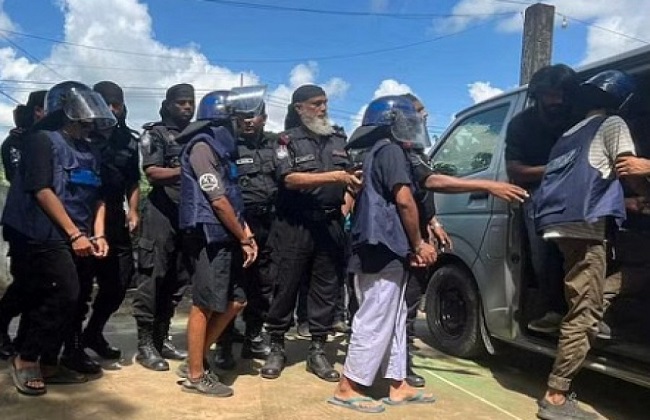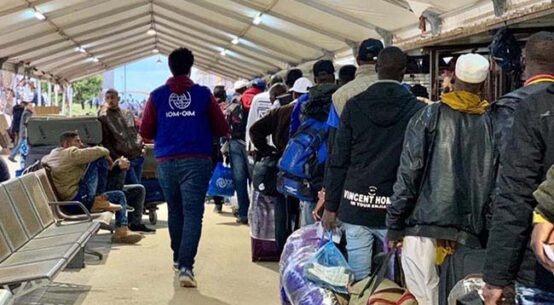
At one time, separatism reared its head strongly. Mistrust and suspicion arose between the ethnic minors in Chittagong Hill Tracts and the Bengalis. However, through the 1997 peace treaty, the hills became calm. The atmosphere of disunity and mistrust created between the minors and the Bengalis is slowly disappearing. Once a rift or area of mistrust is created, it takes time to completely disappear. That time needs to be given. Even those who once took up arms realize the need to give this time. The government also understands. The government is taking various steps for the development of the neglected hill communities by bringing them under special benefits. The mountain environment is very calm now. This calm, peaceful environment does not feel good to Nathan Bawm. He formed an armed wing of his KNF organization, named the Kuki-Chin National Army or KNA.
He has been working in the Chittagong Hill Tracts for the past few years with the aim of building a small Islamic state on the Myanmar-Bangladesh border. Jamaatul Ansar wants to build an Islamic state in the area. And the purpose of Kuki-Chin National Army is to establish an independent or autonomous region called Kuki-Chin with Bawm, Pangkhua, Lushai, Khumi, Mru&Khiangin that region. However, it is known that the militants of Jamaatul Ansar are giving weapons training to the members of Kuki-Chin National Army.
A new armed organization named Kuki-Chin National Front (KNF) has emerged in Chittagong Hill Tracts. It is said to have been developed by some people belonging to the Bawm ethnic group of Bandarban district in Bangladesh.KNF recently opened a page on Facebook in the name of the organization, claiming to represent six ethnic groups of Rangamati and Bandarban regions. They demanded a separate state for the upazilas of Baghaichhari, Barkal, Jurachhari and Bilaichhari in Rangamati and Rowangchhari, Ruma, Thanchi, Lama and Alikadam in Bandarban.
The Kuki-Chin National Army is campaigning through social media. A new conspiracy has started again with Chittagong Hill Tracts (Rangamati, Khagrachari and Bandarban Hill Districts) in the hope of building a separate state in the hilly parts of the country. The separatist organization Kuki-Chin National Front (KNF) has emerged from Rangamati and Bandarban districts consisting of 6 small ethnic groups known as peace-loving (Bawm, Pangkhua, Lushai, Khumi, Mru&Khiang).
The Chakmas, Marmas and Tripuras, the majority of the three tribes of the Chittagong Hill Tracts, are said to have been abandoned in this state. Bawm, Khiang, Pangkhua, Lusai, Khumi and Mrode are kept.After the Chakma, Marma and Tripura in terms of numbers, the Mro population is in the Chittagong Hill Tracts. According to the 1991 census, the total population of Mru is 22,178. Bom population is 6 thousand 978 people. Mruclaims that their actual number is more than 50,000. Bama also claims the same. In their own census in 2014, the number of Bawms was over 17,000.None of the Khiang, Pangkhua, Lusai, Khumis would number more than five thousand.Media reports say that no one but a few youths of Bam have joined the KNF yet.
Various groups in Chittagong Hill Tracts have been committing various crimes including murder, disappearance, kidnapping, rape and extortion for a long time in one-tenth of the country. The number of organizations involved in separatist activities in the hills, including the newly launched KNF, adds more.
In a series of statements circulated on social media, the organization said it has formed an armed group called Kuki-Chin National Army (KNA). The president of their parent organization is Nathan Baum. Now, it may be that the Kuki-Chin population has some problems, some grievances, that Nathan Baum wants to protest. But the solution to the problem is not to take up arms. Will the problem be solved by taking up arms? In an independent country, this is the way to solve the problem? Nathan Baum is an educated person, an artist. It is not the work of the artist to destroy. He could have negotiated with the government to solve the problem. If not resolved through negotiations, there are many avenues open to protest in peaceful ways – which could be done. But he did not borrow them. He immediately took up arms. Any sane person will say that his way is not the way to solve problems. It will only increase complications, violence, but nothing will be done in practical work. Now whether he wants to become another ‘Napoleon the Great’ like the president of Paraguay or he wants to build a state together with Jamaatul Ansar – it may take some more time to see. But giving them an opportunity to raise their heads will only increase the suffering of the common people. The government should not give them an opportunity to play with the safety and peace of the common people. We think that the government should take measures to bring them back to the right path as soon as possible or to suppress them with strict hands.
Not only this, an Islamic militant group called Jamaat Ansar Fil HindalSharqiya is also reported to be training them in weapons. Here’s another blurb. Jamaatul Ansar is basically an organization of splinters of Harkatul Jihad and some other militant groups.
There was a debate about whether there are militants in Bangladesh or not. After the terrorist attack on Gulshan’s Holy Artisan, several major terrorist hideouts were raided in different parts of the country. Then there is not much news of militant activities, but the militants are trying to organize themselves in various ways, that is right. Militants could be kept inactive but could not be eradicated.
Apart from this, the issue of militant activities came to the fore even after the news came out recently as one after another young people from different parts of the country were killed. After the release of the information of 55 youths leaving their homes by the law and order forces, there is renewed curiosity about this. The ‘disappearance’ of such a large number of young people has once again spread anxiety in people’s minds.
Recently, RAB (elite police unit) said that a new militant organization called Jamaatul Ansar Fil HindalSharksfia has been formed. Many homeless youths are hiding in remote areas of Chittagong Hill Tracts. They are being trained there under the umbrella of various organizations. Secretly they are conducting extremist activities. Combined operations have also been conducted in Chittagong Hill Tracts to catch the militants.
Separatism, Terrorism and extremism have become grave threats for all stakeholders in the region. Different groups in the CHT including KNF were trying to destabilise situation along the borders. This could be threat for India and Bangladesh also.
The Bangladesh Rapid Action Battalion (RAB), an elite law enforcement unit, has stepped up operations against militants and separatists in Bandarban and Rangamati’s wooded districts. According to media reports, 10 separatists and militants had been detained in the operation recently. It included three members of the armed separatist group Kuki-Chin National Front (KNF) from Bandarban and Rangamati as well as seven members of the recently formed militant group Jama’atul Ansar Fil HindalSharqiya.
The arrestees admitted that they had a contract with KNF that called for KNF to give them lodging and training in exchange for money. The Emir of Jama’atul Ansar Fil HindalSharqiya made an arrangement with the KNF stationed in Chittagong Hill Tract (CHT) in 2021 to acquire militant training at a cost of Taka 3 lakh per month and cover all KNF members’ food costs. The camps in the CHT territories were providing training for more than 50 insurgents.
Media reports mentioned the situation of several young males who recently fled their homes and went missing, saying that the majority of these people are hiding in the CHT forests.Along with additional equipment and jihadi publications, RAB also found nine weapons, 50 rounds of ammunition, cartridges, 62 cases, six bombs, cartridge case, two cartridge belts, and one locally produced pistol.
It is alleged by some International media that some Chin-Kuki people fled to Mizoram’s Lawngtlai district from the Chittagong Hill Tracts in Bangladesh in the face of an alleged offensive by the Bangladesh Army against an armed group of the community.
But basically, it is anti-terrorist and separatist operations. Bangladesh is working to ensure peace and stability in the CHT region. Some separate incidents may happen for the operations. But Bangladesh believes in harmony. Bangladesh doesn’t want any kind of exodus of its people to its neighboring country. The members of the all ethnic groups in the region are the people of Bangladesh. The region is a very significant strategically for both India and Bangladesh. Unrest in the region may become a grave threat for India and Bangladesh also. India should support Bangladesh’s anti-militant operation as Bangladesh paved the way in ensuring peace, harmony and stability in Northeastern region in cooperating India to tackle separatism, extremism in the region.
Bangladesh is a responsible country in the world. It is known to shelter human beings (Rohingyas from Myanmar) and take back its people to its lard (Chakma people in 1994). Bangladesh wants to ensure perpetual regional peace in the region (in the line of 1997 (Chittagong Hill Tracts Peace Accord).
Bengalis and Non-Bengalis in the Chittagong Hill Tracts region celebrate together the tribal festivals such as Biju, Sangria, Baisabi etc. There is no religious, ethnic boundary in Bangladesh. Everyone is for everyone. People from all ethnicities are united in Bangladesh. The recent exodus incident is just a separate incident in Bangladesh because there are only some people who may migrate to Mizoram.
Militants and terrorists are trying to unite again in Bangladesh. Recently, the issue of militancy has come to the fore in the incident of several youth being killed. There is enough reason to be alarmed by the reports of activities of militant organizations under new names. Most of the missing youths who leave their homes in the name of alleged migration are falling into the trap of banned militant organizations.
Many top-level militant leaders are active behind the scenes to misguide them or trap them. Militant groups are waiting for time and opportunity. After the arrest of four members of Jamaatul Ansar Fil HindalSharqiya, RAB said recently that this new militant organization is giving money to the Kuki-Chin National Front, a separatist organization in the hills, to buy heavy weapons. RAB said that in the last 8-9 months, the organization has paid 17 lakhs to KNF, an armed organization of Pahar, to buy heavy weapons. About 50 lakh rupees have been sent to various places through banking channel and mobile banking to manage the activities of the organization.
Separatist organizations Kuki-Chin National Front (KNF) and United People’s Democratic Front (UPDF) are always trying to create unrest in Bangladesh’s border areas,Home Minister Asaduzzaman Khan Kamal has said.
Security forces in Bangladesh have started an operation on a young, armed tribal group that they claim assisted in the training of a potential Muslim extremist organization in the unrest-ridden Chittagong Hill Tracts, a region in the country’s southeast that is close to the borders with Myanmar and India.
Manyclaims to have discovered a solid connection between the national front and Jama’atul Ansar Fil HindalSharqiya, a purportedly recently created Muslim extremist organisation. Home Minister Asaduzzaman Khan stated, “We have definite information that the newly established militant organization was being trained by KNF in isolated areas of Bandarban district.
Bangladesh, a nation with a majority of moderate Muslims, has experienced violent Islamic extremism on multiple occasions, most notably in July 2016, when five extremists with ties to the Islamic State group massacred 20 hostages—mostly foreigners—during an overnight siege at a café in Dhaka.
The allegations that KNF cooperated with an Islamic extremist group have not yet been formally addressed. However, as the opeartion got underway, the group denied being a “separatist” outfit.
Violent militancy in Bangladesh had significantly decreased in recent years following a successful, albeit harsh, crackdown by the security forces and a reduction in global extremism.
Terrorism can be controlled to a great extent if we can control them primarily. Therefore, strict action should be taken against individuals and organizations involved in terrorist and separatist activities. For this, the law enforcement forces should be made more efficient. We want to see zero tolerance against terrorists not only in words but also in reality.
Samina Akhter is a Dhaka-based author and columnist.


